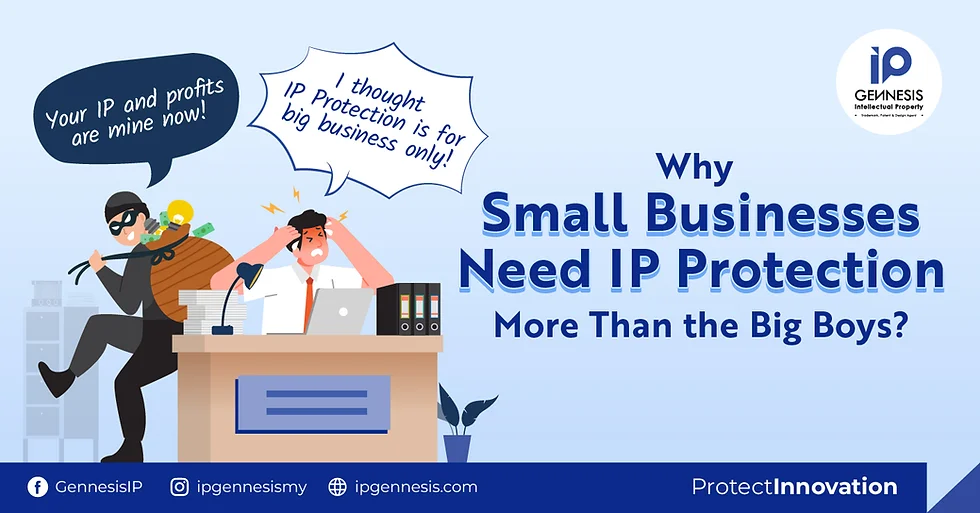This guide aims to educate small business owners and entrepreneurs on the basics of intellectual property (IP). Intellectual property refers to creations of the mind, such as inventions, literary and artistic works, symbols, names, images, and designs used in commerce. IP is protected by law through patents, copyrights, trademarks, trade secrets, and other forms of legal protection.
Toc
Introduction to Intellectual Property

Intellectual property (IP) is a term used to describe the intangible assets that are created through human ingenuity, such as ideas, inventions, artistic works, and designs. Having effective IP protection is crucial for small businesses to safeguard their creations and maintain a competitive edge in the market.
What is Intellectual Property Law?
Intellectual property law is a branch of law that deals with the protection and enforcement of intellectual property rights. It encompasses various legal principles, rules, and regulations that govern the creation, ownership, use, and transfer of IP assets.
How Intellectual Property Works
Intellectual property works by granting creators exclusive rights to their inventions, works, and brands for a certain period. This legal framework allows them to control how their creations are used and monetised while also providing them with tools to enforce their rights against unauthorized use. Each type of IP, whether it be patents for inventions, copyrights for artistic works, or trademarks for brands, has specific criteria and processes for obtaining protection. Understanding these differences is essential for small business owners to effectively leverage their intellectual assets. By navigating the IP landscape, businesses can protect their innovations, build brand recognition, and enhance their overall market position.
Why is Intellectual Property Important for Small Businesses?
As a small business owner or entrepreneur, you have likely invested significant time and resources into developing your ideas and products. Protecting your intellectual property is crucial because it gives you exclusive rights to use and profit from your creations. It also allows you to prevent others from copying or using your work without permission.
Furthermore, strong IP protection can help attract investors and partners by showing the value of your business’s intangible assets. It also gives you a competitive advantage in the market, as competitors cannot easily replicate your ideas or products.
Types of Intellectual Property Protection

There are several types of intellectual property protection available, each serving a specific purpose and covering different types of creations.
Patents
Patents are a type of intellectual property protection that grants inventors exclusive rights to make, use, sell, and distribute their inventions for a limited period, typically 20 years from the filing date. There are three main types of patents: utility patents, which cover new and useful processes, machines, or compositions of matter; design patents, which protect new, original, and ornamental designs for articles of manufacture; and plant patents, which are granted for new varieties of plants. To obtain a patent, the inventor must disclose their invention in detail, demonstrating that it is novel, non-obvious, and useful.
For small businesses, securing a patent can provide a significant competitive edge. It not only protects their innovations from being copied by others but also serves as a valuable asset that can be licensed or sold, thereby generating revenue. Moreover, the presence of patents can enhance a company’s credibility and attract potential investors, as it reflects a commitment to innovation and the development of new technologies. However, the patent application process can be complex and time-consuming, making it essential for business owners to seek professional guidance to navigate the requirements successfully.
Copyrights
Copyrights are a form of intellectual property protection that grants creators exclusive rights to their original works of authorship, such as literary texts, music, visual arts, and software. Unlike patents, copyrights do not require a formal registration process to take effect; protection is automatically granted upon the creation and fixation of the work in a tangible medium. However, registering a copyright with the U.S. Copyright Office provides additional legal advantages, including the ability to sue for statutory damages and attorney’s fees in case of infringement.
For small businesses, copyrights play a vital role in safeguarding creative works that contribute to brand identity and market differentiation. This includes marketing materials, websites, product packaging, and any original content produced by the business. Protecting these assets ensures that competitors cannot use or reproduce them without permission, preserving the unique voice and originality of the brand. Moreover, strong copyright protection can open avenues for monetization, such as licensing agreements or collaborations with other creators, thereby providing additional revenue streams for small business owners. Understanding copyright law is essential for effectively managing intellectual property and enhancing the value of creative outputs.
Trademarks
Trademarks are symbols, words, or designs that distinguish the source of goods or services from those of others. They serve as a form of intellectual property protection that helps customers identify and associate products with specific businesses. Like copyrights, trademarks do not require formal registration to be protected; however, registering a trademark with the U.S. Patent and Trademark Office (USPTO) provides additional legal benefits, including nationwide protection and the ability to sue for infringement.
For small businesses, trademarks are essential in building brand recognition and establishing customer trust. By creating a unique and recognizable brand identity through logos, slogans, and other identifiers, companies can differentiate themselves from competitors and create a loyal customer base. Trademarks also serve as valuable assets that can be licensed or sold, providing additional revenue opportunities for small businesses. However, it is crucial to conduct a thorough trademark search before using a particular mark to avoid potential conflicts with existing trademarks.
Trade Secrets
Trade secrets consist of confidential business information that gives a company a competitive advantage. This can include formulas, practices, processes, designs, instruments, or a compilation of information that is not generally known or reasonably ascertainable by others. Unlike other forms of intellectual property, trade secrets are protected without a formal registration process, but businesses must take reasonable steps to maintain their secrecy. This might involve implementing non-disclosure agreements (NDAs), employee training, and restricted access to sensitive information.
For small businesses, maintaining trade secrets can be a powerful strategy for protecting unique product formulas or proprietary processes essential to their operations. By keeping these critical elements confidential, companies can safeguard their innovation from competitors who may attempt to replicate their success. Moreover, since trade secrets can potentially last indefinitely, they provide lasting protection as long as the information remains secret. However, it requires a proactive approach to ensure that security measures are in place, as once a trade secret is publicly disclosed, the protection can be lost. Understanding how to effectively manage and protect trade secrets is vital for enhancing a small business’s overall intellectual property strategy.
- https://hamona.vn/understanding-tampas-family-law-dynamics/
- https://hamona.vn/understanding-maritime-law-in-houston-essential-insights-for-industry-professionals/
- https://hamona.vn/unraveling-the-complexity-of-family-law-in-denver/
- https://hamona.vn/the-legal-anchors-of-maritime-trade-admiralty-laws-explained/
- https://hamona.vn/securing-your-defense-why-military-personnel-need-attorneys/
Protecting Your Business’s Intellectual Property

In today’s competitive market, intellectual property plays a crucial role in the success of small businesses. By understanding and effectively managing patents, copyrights, trademarks, and trade secrets, business owners can protect their innovation and creativity and utilize these assets to create additional revenue streams.
Steps to Safeguard Your Creations
- Identify Your IP: Determine which aspects of your business qualify as intellectual property.
- Register Your IP: File for copyrights, trademarks, and patents as applicable. Registration offers legal protection and can be crucial in enforcing your rights.
- Implement Confidentiality Agreements: Use non-disclosure agreements (NDAs) to protect trade secrets when sharing information with employees or partners.
- Monitor Your IP: Keep track of any infringement or unauthorized use of your intellectual property and take necessary legal action.
- Educate Your Employees: Train employees to understand the importance of protecting intellectual property and how to identify potential infringement.
- Consult with Professionals: Seek guidance from intellectual property attorneys or organizations like the U.S. Small Business Administration (SBA) for assistance in managing and protecting your IP.
Benefits of Registering IP
- Legal Protection: Registered IP can be legally enforced, providing a stronger defense against infringement.
- Market Advantage: Protecting your IP can give you exclusive rights to your innovations, enhancing your market position.
- Monetary Value: Registered IP can be licensed or sold, providing additional revenue streams.
- Long-Term Protection: Patents, trademarks, and copyrights can potentially last for decades, providing lasting protection for your business.
As a small business owner, understanding the importance of intellectual property and taking proactive measures to safeguard it is crucial in today’s competitive market. By managing and protecting your IP effectively, you can ensure the longevity of your business and potentially open up new opportunities for growth and revenue. So, it is essential to stay informed about changes in laws related to intellectual property and regularly review your IP strategy to ensure that you are adequately protected.
Common Misconceptions about IP

Despite the importance of intellectual property, there are several common misconceptions that small business owners may have. These include:
I Don’t Need to Register My IP
Many small business owners believe that they do not need to register their intellectual property (IP) to be protected. However, this is a misconception. While some forms of IP, like trade secrets, are protected without formal registration, patents, trademarks, and copyrights benefit significantly from being registered. Registration provides public notice of ownership, making it easier to enforce rights in case of infringement. Furthermore, registered IP often carries a presumption of validity, meaning that it is presumed to be owned by the registrant until proven otherwise. This legal advantage can be crucial in disputes and enhances a business’s credibility and marketability.
IP Protection is Only for Large Companies
Another common misconception is that IP protection is only relevant for large corporations. In reality, small businesses can be just as innovative and vulnerable to infringement. Without proper protections in place, a small business may find it challenging to compete effectively, especially if larger companies exploit their inventions without consequence. By proactively seeking IP protection, small businesses can defend their unique offerings and maintain a competitive edge in the marketplace.
Once I Have IP, I’m Fully Protected
Some entrepreneurs think that merely obtaining IP rights guarantees complete protection. However, to maintain and enforce these rights, ongoing vigilance is required. This includes monitoring the market for potential infringements, renewing registrations as necessary, and taking appropriate legal action when violations occur. IP management is an ongoing process that requires attention and resources to ensure that the business remains safeguarded against infringement and misappropriation.
By addressing these misconceptions and understanding the importance of IP protection, small business owners can better navigate the complexities of intellectual property law. Taking the necessary steps to protect their innovations not only secures their interests but also fuels growth and fosters a culture of creativity within their organizations.
Resources and Next Steps

After reviewing these resources, consider consulting with an intellectual property attorney or other professionals to develop a comprehensive IP strategy that meets the specific needs of your business. By prioritizing the protection of your intellectual property, you can safeguard your creativity and drive long-term success for your small business. So, stay informed about changes in laws related to IP, regularly review and update your strategy, and take necessary measures to defend your innovations against infringement.
U.S. Patent and Trademark Office (USPTO)
The U.S. Patent and Trademark Office (USPTO) serves as an essential resource for businesses looking to protect their intellectual property. The USPTO manages the registration of patents and trademarks, providing detailed guidance on the application process. Their website offers valuable tools, such as search databases, that allow entrepreneurs to check for existing patents or trademarks, ensuring that their creations are unique and eligible for protection. Furthermore, the USPTO provides educational resources, including webinars and workshops, to help business owners understand the intricacies of IP law and navigate the complexities of the registration process. Establishing a relationship with the USPTO can empower small business owners to make informed decisions regarding their intellectual property strategies and bolster their competitive standing in the marketplace.
U.S. Copyright Office
The U.S. Copyright Office is responsible for registering copyrights, which protect original works of authorship such as literary, dramatic, musical, and artistic creations. Similar to the USPTO, their website offers extensive resources and information on copyright registration and enforcement. Additionally, the Copyright Office conducts literature searches upon request to assist businesses in determining if their work is eligible for copyright protection.
Small Business Administration (SBA)
The Small Business Administration (SBA) offers numerous resources for small business owners seeking guidance on intellectual property management. This includes educational materials, webinars, and workshops that cover topics like IP strategy development and the application process for patents, trademarks, and copyrights. The SBA also provides access to local resource partners, such as Small Business Development Centers and SCORE chapters, where entrepreneurs can receive personalized counseling and assistance with their IP needs.
Federal Trade Commission (FTC)
The Federal Trade Commission (FTC) is an agency responsible for protecting consumers and promoting competition in the marketplace. The FTC plays a crucial role in enforcing IP regulations by monitoring potential infringement and prosecuting cases of deceptive trade practices that may harm small businesses. Their website offers valuable information on consumer protection laws, including those related to intellectual property, and resources for reporting infringements or unfair business practices.
Conclusion
In the rapidly evolving business landscape, understanding and protecting intellectual property is vital for small businesses striving to grow and innovate. By dispelling common misconceptions about IP protection, small business owners can better recognize the strategic importance of safeguarding their creations. Engaging with resources such as the USPTO, Copyright Office, SBA, and FTC not only enhances their knowledge but also equips them with the tools necessary to implement effective IP strategies. As entrepreneurs proactively protect their intellectual property, they lay a solid foundation for sustainable success and foster a culture of creativity that can lead to further innovation within their industries. Thus, it is essential for small businesses to prioritize IP management as a core component of their overall strategy, ensuring they remain competitive in an ever-changing market.







